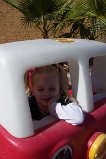My what fun we have when we play outside together! We have been so lucky lately to be able to go out and enjoy the beautiful Nevada weather! When we play outside it is a totally different learning environement. We have many opprtunities to practice our social skills and further develop our motor skills.
It is proven that children’s learning occurs best when the whole self is involved and we all know that "play" is an active form of leanring. Children expand their ability to express and work out emotional aspects of everyday experiences through unstructured play. This is crucial to the complete development of social skills. When children are permitted to play freely with peers, they develop skills for seeing things through another person’s point of view. There working on cooperating, helping, sharing, and solving problems with others.
MANY state preschool standards are addressed through active play. Below are some examples of the Social Emotional standards addressed.
1.PK.1a Make independent choices from diverse interest centers or activities.
1.PK.2a Express ideas for activities; initiate and participate in discussions with teachers or peers.
1.PK.2b Acknowledge actions and accomplishments verbally and nonverbally.
1.PK.3 Re-engage in a task or activity after experiencing disappointment, frustration, or failure.
3.PK.1 Identify a range of feelings (e.g., sadness, anger, fear, and happiness).
3.PK.2a Express feelings, needs or wants in appropriate ways.
3.PK.2b Demonstrate awareness of feelings of others (e.g., gets blanket for friend and comforts him/her when he/she feels sad).
4.PK.1c Respect rights and belongings of others (e.g., "It is my turn to use the bike, but you can have the bike when I am finished").
4.PK.1d Demonstrate problem-solving skills (e.g. ask for help from an adult, talk about problems, talk about feelings relating to problems, and negotiate solutions).
5.PK.1a Play independently.
5.PK.1b Play in pairs and small groups.
6.PK.1c Use verbal and non-verbal conversation skills (e.g., listening, letting a person finish speaking before taking a turn, staying with one topic, maintaining eye contact, etc.).








No comments:
Post a Comment